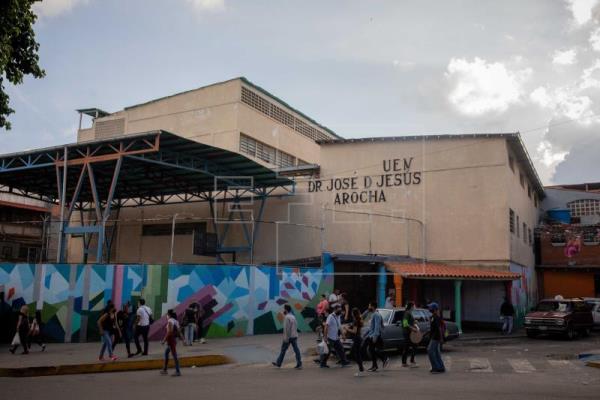
Venezuelan teachers flee the profession in droves due to low pay | vía: EFE
Gonzalo Dominguez Loeda | Caracas | 28 de agosto de 2021 | Foto: EFE/Rayner Peña R.
Last December, after 17 years in the classroom, Jonathan Gonzalez became one of the nearly 200,000 Venezuelan teachers to abandon the profession for economic reasons.
“It makes me a little sad to give up my work because it is part of a life, but I made the sorrowful decision to pull this up by the roots, to retire,” the former art teacher tells Efe.
Gonzalez, 42, now earns his living as a tattoo artist.
He confesses that the loss of his accustomed interaction with students and colleagues pushed him into a depression.
“You are busy co-existing with so many people and that matter of teaching, which is something positive. There are kids who learn from you, you become a figure,” Gonzalez says.
Ultimately, however, the economic reality intruded: “The salary is not enough even for half a carton of eggs.”
Base pay for teachers in Venezuela’s public schools is the equivalent of less than $20 a month.
“It has been difficult to start over with another occupation,” Gonzalez acknowledges, while noting that he is not alone in making a change, as a score of the roughly 45 teachers who were his colleagues at a school in Caracas have likewise quit in the last year.
He says that his most intense moments of regret about leaving the profession come when he encounters former students.
“I have seen them selling things on the street or playing,” Gonzalez says. “There are children who don’t read well, who don’t know how to write or make a presentation.”
“This, in the future, will bring a lot of ignorance,” he concludes.
Morelis Carruido, 54, who walked away from teaching to take up tailoring, says that on a good day, she makes as much as she formerly earned in a month.
Roughly 200,000 educators – nearly a third of the total – have given up the profession due to economic necessity, teachers union executive Gricelda Sanchez tells Efe, describing the situation as “a great tragedy.”
Many students, she says, “are simply left without a teacher.”
And the financial squeeze on teachers is almost certain to grow more acute when the government decides to return to in-person schooling, according to Sanchez, who predicts “mass resignations.”
Working from home has given teachers time and scope to pursue side-gigs for extra money, but a return to the classroom would put a end to that.
“Today, regrettably, the teacher is not going to give up this work of reinvention to go to school because he or she cannot support his or her household that way,” Sanchez says. EFE gdl/dr